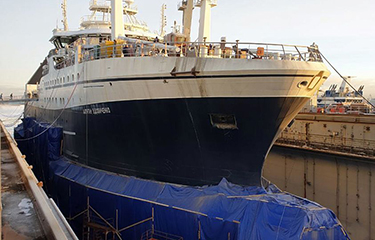Russian fishing industry warns shipbuilding capacity insufficient to meet quota auction requirements

As Russia moves forward on its plans to run a second round of investment-quota auctions in 2023, the country’s shipbuilders are warning they’re already at capacity.
Russia first launched investment quotas in 2017 as a means of incentivizing Russian companies to build new fishing vessels and processing plants inside the country. At the time, Russian Federal Agency for Fisheries Head Ilya Shestakov told SeafoodSource that the country’s aging fleet was “becoming a bottleneck to the industry’s development.”
Quotas were awarded with requirements that winners build new vessels within Russia. However, Russian shipyards faced immediate problems meeting the sudden increase in demand, and allocations tied to the timely delivery of new-builds put the incentive program at risk. By February 2023, of the 64 fishing and 41 crab vessels that had been ordered, just 14 had been handed over to companies.
The fresh round of investment quotas has instituted a points-based assessment system with significant additional localization requirements, which industry officials said aren’t realistic.
In March 2023, Association of Crab Producers President Alexander Duplyakov told Fishnews that some shipbuilding capabilities aren’t currently available in Russia due to capacity and supply constrains. The bar companies need to achieve for a ship to be considered a Russian product “cannot be achieved without the installation of a domestic propulsion complex," he said.
However, the availability of engines, propellers, rudder propeller groups, and other equipment that would make up such a complex is low or nonexistent, Association of Fishing Fleet Owners Alexei Osintsev said at a roundtable organized by the Corporation for the Development of the Far East and the Arctic, which included representatives from the Russian Ministry of Industry and Trade, Fishnews reported. That lack of availability often forces companies to change plans, Osintsev said.
“It is impossible to include in the project something that is not there,” Osintsev said. “Any change then entails a complete redrawing of the project with the corresponding costs and losses.”
Russian Fishing Company Board Member Stanislav Aksenov said much of the equipment needed for the upgrading of the Russian fleet is currently not produced in Russia and that it is taking time to establish domestic supply chains for many items.
Russia Shipbuilding Industry and Marine Engineering Department Deputy Director Irina Ornicheva said the ministry of trade is working on the issue, but will advocate that the localization requirements remain at the level which they were at before 1 July, 2023.
Photo courtesy of the Russian Fishery Company






Share